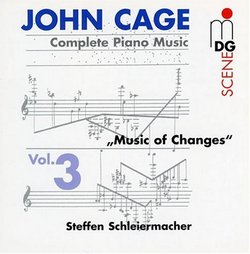| All Artists: Steffen Schleiermacher Title: John Cage - Complete Piano Music, Vol. 3 - "Music Of Changes" / Schleiermacher Members Wishing: 2 Total Copies: 0 Label: MD&G Records Release Date: 6/22/1999 Album Type: Import Genre: Classical Styles: Chamber Music, Forms & Genres, Short Forms, Historical Periods, Classical (c.1770-1830), Instruments, Keyboard Number of Discs: 1 SwapaCD Credits: 1 UPC: 760623078625 |
Search - Steffen Schleiermacher :: John Cage - Complete Piano Music, Vol. 3 - "Music Of Changes" / Schleiermacher
 | Steffen Schleiermacher John Cage - Complete Piano Music, Vol. 3 - "Music Of Changes" / Schleiermacher Genre: Classical
|
Larger Image |
CD Details |
CD ReviewsHard core listening required here scarecrow | Chicago, Illinois United States | 01/13/2005 (5 out of 5 stars) "John Cage wrote piano music his entire life, and in a way it followed his creative interests from the beauty of the early works for prepared piano,to the graphic notation period,("Concert for Piano, "Music for Piano. . ." series, "Music of Changes") to the electronic works with tape,
(various "Variations" 1 to 7)(not all can be for piano) to the "Etudes" of the Seventies, to process pieces of the Eighties and Nineties. The "Music of Changes"is a seminal work in a way it was a response to serial music of Europe.It has an elaborate "changes"scheme of durational alternatives, something that had intrigued the entire post-war generation. Here Cage was interested in pure shape, pure measurements of time. And after a decade of prepared piano works,he now breaks to the threadbare timbre of the normal piano. Here one starts at a given metronome mark, quarter note is 69, accelerates for 3 measures to quarter equals 176. then slows to for 5 measures of quarter is 100. The Note durations themselves are also measured horozontally with 2.5 centimeters, with precesely notated dynamics within the spectrum of pppp to ffff. The concept here is to appraise music in terms of its pure densities, and how those densities, or "points" become distributed over a given duration of time, so one can begin to see the fascinating elegance of the work, where durations are measured from note to note, or in real time, between seconds, or larger division, one minute to one minute, I find that I can usually sustain something, a musical event in my memory for 30 seconds, while simultaneously reataining all the new events bonbarding my consciousness, as time proceeds, then things get complicated for then musical "points" begin to fall off the memory pallette; and we become draw then to timbre that seem to dazzle the imagination more than others. You simply cannot help this,for we search for these events in music. Experiencing the "Music of Changes" is supposed to make one give one a multidimensional state of listening(something the late Morton Feldman continued with :Triadic Memories:), much like the Matrix, a "matrix" for appraising and realizing timbre in our minds. You might find this work somewhat arbitrary,tedious, beautiful,sterile,and powerful, we simply do not have the means anymore to simply listen,all the "prettified" mimimalism,nebulous popular forms (mixed with serious music genres) we have experienced I think works against a piece like this,for all our listening habits have made our listening constitution weak, sterile. How can one appraise a performance of this work is beyond words, for one either has a sensitivity to timbre or not, no matter who one consults or studies with. You really need to have a third person distancing, something remarkably the late David Tudor had. Herbert Henck also has nice wonderful things he does to this work, as Schleiermacher. The work also has an interesting sense of space, lour notes being in front perspective, sodter tones being distant." |

 Track Listings (4) - Disc #1
Track Listings (4) - Disc #1